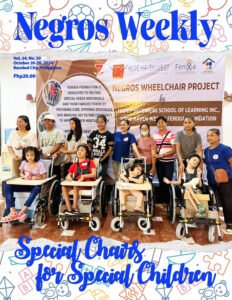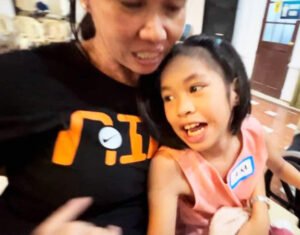
Gratefulness filled the air at Benjamin Hall in Bacolod City on Oct. 15 and 16. The occasion was the distribution of customized wheelchairs to 96 children with cerebral palsy and adults from Bacolod City and Negros Occidental.
Among those who expressed profound thanks was Gerah Longhay of San Enrique whose 6-year-old son, Josh Gabriel, has been bedridden for a long time, the reason why she had to quit working so she can look after him full-time.
Josh Gabriel was diagnosed with drug-resistant epilepsy and developmental delay, his situation preventing him from sitting upright and causing him lack of balance and muscle control.
Adding to the family’s woes is the pneumonia he contracted which caused his monthly hospital admission.
His condition has kept me from working and doing domestic chores as I could not leave him alone, his mother said.
A similar sentiment was aired by Rogelio Planas, also a San Enrique resident. “I can now take with us Angel, my granddaughter, wherever we go,” he said, adding: It wouldn’t be hard for us to take her around anymore as she could neither stand nor sit by herself.
Angel was diagnosed with developmental delay when she was 6 months old.
***
The object of their gratefulness are Fenixia Foundation Inc. and Hope Haven West, which are based in Palm Desert and Modesto, respectively, both located in the state of California.
The founders of both charitable organizations – Lisa Valerio of Fenixia and Lonny Davis of Hope Haven West – both came to Bacolod City for the turnover of the wheelchairs to their beneficiaries.


Fenixia, in its website, said it is “dedicated to helping special-needs adults, children and their families thrive by providing care, offering resources, and bringing joy to this community to improve their mental health.”
Our mission is to help special needs individuals realize their potential, help families support their loved ones, and help caregivers and educators develop their ability to make a positive difference in this community, Fenixia further said.
Guided by its philosophy of “Providing Dignity through Mobility”, Hope Haven West aims to help the disabled poor in developing countries.
In pursuing its mission, its volunteers collect used and discarded wheelchairs, refurbish them, and prepare them for distribution. It also distributes newly-manufactured pediatric wheelchairs.
Valerio and Davis led the team of 20 American, Caucasian and Filipino volunteers, who came to Bacolod and assembled the wheelchairs for distribution.
***
Valerio said her first mission in the Philippines was in 2016 – primarily for children with intellectual disabilities, like autism, Down Syndrome and ADHD.
She eventually expanded her mission to include children with cerebral palsy after seeding the plight of their families.



Valerio recalled that her passion to help children with cerebral palsy was triggered when she saw parents literally carrying their children.
“This is bigger, way bigger than I had envisioned the dream,” she said as she added: These kids need chairs, as somebody has to be constantly holding them, so I think the wheelchairs are going to give them independence and make them feel good about themselves… I’m just so touched we’re able to put this into action today.
The Fenixia Foundation leader has been helping orphanages and educational institutions in the Philippines for three decades now, after her son, Nathan, was diagnosed with autism in 2003. Since then, as a tireless advocate for her son’s wellbeing, she has been committed to “sharing the knowledge and resources that she had developed to support her son.”
Her foundation was named, in recognition of its origins, after the Fenixia flower, which is endemic to the Philippines.
***
Davis, on the other hand, shared that many of the wheelchairs they donated were flown from Chicago and were manufactured for charitable reasons in a prison in South Dakota.
We have other wheelchairs that were collected from all over the United States and were refurbished many times by prisoners in facilities across the country, he said.
The complex rehab wheelchairs, he further said, cost between $3,000 and $10,000 and they are sturdy durable and functional for between five and ten years.




Davis, in Hope Haven West’s website, said his nonprofit organization, which has been operating for two decades, has been ramping up the production of wheelchairs at an average of 1,200 units and “for the poorest of the poor across the globe.”
Hope Haven West, Davis further said, has distributed for the last 25 years about 20,000 wheelchairs in countries all over the world.
***
The local distribution was coordinated by Anne Marie Makilan, president of Happy Beginners School of Learning located at Barangay 39 with a branch in Bago City.
Makilan met Valerio during her Negros mission in 2018.
Their mothering story share a common thread as the school head’s son was also diagnosed with an intellectual development issue, that eventually inspired her to open a school for children, especially those with special needs.
Makilan said Valerio recently called her with the instruction to gather 209 children with cerebral palsy for the wheelchair distribution program.
She immediately contacted Special Education class teachers and the Persons with Disability Affairs Office to identify qualified beneficiaries.
Their list of beneficiaries fell short of the target of 200 which the donors required, she said. Afraid that it will be an opportunity lost, she said, they reached out to Davao counterparts, who managed to fill in the remaining number needed for the 200 required beneficiaries.
Joining the team in Bacolod was Dr. Ferdeliza Garcia, a community-based rehabilitation practitioner in Metro Manila.
Dr. Garcia specializes in wheelchair service provision.
She joined the volunteer team to ensure that the beneficiaries would be able to maximize the use of the features of their wheelchairs.
“There’s a need to really increase awareness that when you give out wheelchairs, it’s not simply giving out a chair. It’s like a shoe. Will you accept a shoe that’s not your size? It’s something to raise awareness among our countrymen,” she said.
She added that while there’s a lot of people who have good intentions by giving out wheelchairs, we have to emphasize that doing good should also be done right.
***
Indeed, the wheelchairs we got are a big help not only for our physically-challenged children but also for us, parents and our families, and for this we are grateful, Longhay and Planas reiterated. | YPDormido




